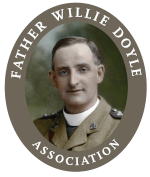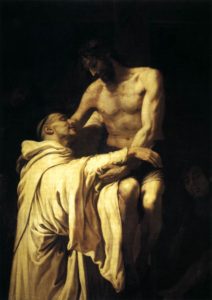How many deceive themselves in thinking sanctity consists in the holy follies of the saints! How many look upon holiness as something beyond their reach or capability, and think that it is to be found only in the performance of extraordinary actions. Satisfied that they have not the strength for great austerities, the time for much prayer, or the courage for painful humiliations, they silence their conscience with the thought that great sanctity is not for them, that they have not been called to be saints. With their eyes fixed on the heroic deeds of the few, they miss the daily little sacrifices God asks them to make; and while waiting for something great to prove their love, they lose the countless little opportunities of sanctification each day bears with it in its bosom.
COMMENTS: Today is the feast of St Bernard. It seems as good a day as any to address some of the controversies that seem to surround Fr Doyle’s life of penance.
In today’s quotation, Fr Doyle is clear that sanctity does not necessitate severe penances. Yes, a few are called by that path, but we are all called along the path of embracing the tasks and challenges of each day. We are all called to some form of penance, but for the most part it will be moderate and focused on doing our duties well. This is not easy but it is ultimately within our reach, if we will it and if we rely on God’s grace.
Fr Doyle certainly embraced the mundane tasks of each day. But he also went much further and lived a life of austerity. This caused something of a scandal for a very small number of people when it was revealed in O’Rahilly’s biography (though it is noteworthy that in his later editions, O’Rahilly mentions a number of Protestant clerics who admired Fr Doyle’s example in this area).
It is clear that Fr Doyle lived a most vigorous life of action during the war and that his health was in no way compromised as a result of his penances; in fact he even reported that he felt more energetic and healthy following penance. If the test of prudence in penance is that it does not interfere with our daily duties and tasks, then he most certainly passed that test.
It is also clear, from today’s quotation and from many others, that he never advised others to adopt hard physical penances and in fact he often forbade others to do so. Everything Fr Doyle did had a precedent in the lives of the saints, including some of the most popular, modern saints. It also appears that he had, or at least he thought he had, a specific calling to austerity of this type. It is also worth noting that Fr Doyle seems to have given up the hard physical penances for the last years of his life in the trenches, instead cheerfully embracing the hardships of that most awful life as his penance.
Fr Doyle also acted with the approval of his superiors. From one of his letters:
The Provincial told me to make known my devotions, penances etc to Father X…and to do whatever he told me. My heart fell, for perhaps of all the Jesuits in Ireland he would be the last I should care to consult on these things, I knew it was not his line and I felt if I got permission for one discipline a month I would do well. He was just the opposite to what I expected, was most kind and encouraging and ended by telling me to do whatever I thought God wanted, so I had the reward of being obedient.
This would seem to be the definitive seal of approval on Fr Doyle’s spiritual life.
We must not forget the context in which Fr Doyle lived. It is also important to remember that people – even the very holy – are influenced by their surrounding culture. Corporal penance was the norm in religious life right up to a few decades ago. Some well known Jesuits destroyed their private notes before death precisely because of the way the secrets of Fr Doyle’s spiritual life became public following the discovery of his diaries. Perhaps Fr Doyle’s penances were more common than we imagine. It is also worth remembering that penance – moderate and appropriate for our condition – is a normal part of the Christian life, so much so that the ever popular St John XXIII wrote an entire encyclical on penance and urged Catholics to offer penances for the success of the Second Vatican Council. Penance is not something obscure or disturbing in the Christian life. Indeed, we now live in a culture where hard, pressured work is seen as the norm, and where many people punish their bodies in a gym – this work, and these workouts, are probably much harsher than the penances many religious practiced in the past. Consider how many take part in Ironman competitions, for example. The competitors start with a 2.4 mile swim, followed by a 112 mile cycle and concluding with a 26 mile running race…
Yes, corporal penance was an aspect of Fr Doyle’s life, as with almost all canonised saints. But these hard penances were only one aspect of Fr Doyle’s spirituality. It would be a mistake to sum up a charming personality like that of St Pope John Paul II only by reference to the modified leather belt with which he scourged himself (it has never been made clear in what way the belt was modified – did it perhaps have something sharp or heavy embedded within it to make it a penitential item?) or St Therese of Lisieux only by reference to the hairshirt which she wore, or Blessed John Sullivan by the floor on which he slept and the chains which he wore. We can keep multiplying the examples – Venerable Matt Talbot, St Pio of Pietrelcina, St Francis of Assisi, St Dominic, St Ignatius, St Martin de Porres and on and on. There is so much more to the remarkable personalities of the saints than the physical penance they practiced. We should not ignore this aspect of the lives of the saints, but neither should we allow it to overshadow the rest of their lives and certainly we should not dismiss the saints because they practiced heroic penances.
And this brings us to today’s feast of St Bernard, who admitted that he ruined his health through imprudent penance, and repented of his folly. This revelation of his imprudence does not make St Bernard any less of a role model for the rest of us, nor did it ever prevent him from being canonised or declared a Doctor of the Church.

